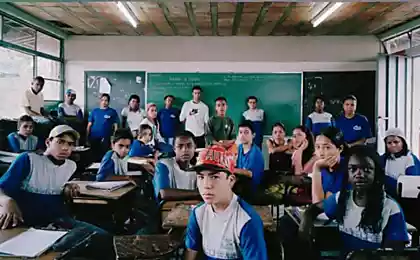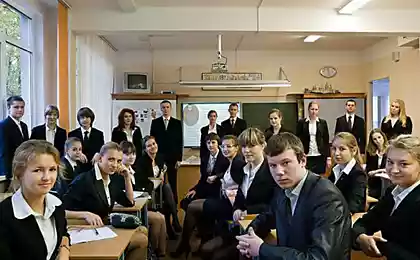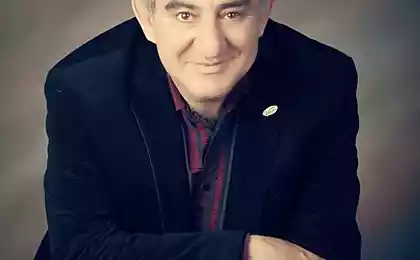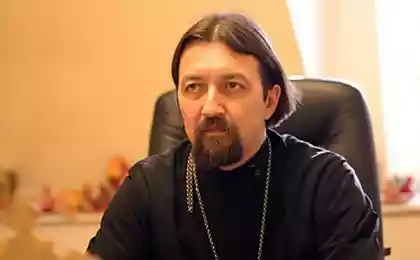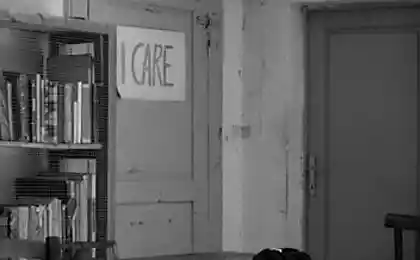467
School years unnoticed. Part one
Once gathered at our table of friends were talking about "What? Where? When?" and about how people take questions for her. One visitor said she has a good question-a riddle:
– Try to guess who are the five brothers. Two bearded, two beardless...
– and last, the fifth looks ugly: just right beard, left no trace! – picked up and finished me.
How do you know? – astonishment asked my companion.
All present waited with interest for the answer. They were ten people, all between the ages of thirty and forty, highly educated, professionally successful and culturally developed. Each of them at the time, not just once or twice were holding the book with this poem. And no it is not remembered. And when I called her, I just refused to believe it.
To me remained nothing how to take off the shelf this book – a textbook of botany for secondary schools – and making sure that everyone studied it, open it to a page, where was the mystery and its solution. The whole company looked at me as if I looked in the book for something it was not and could not be – say, a couple of pages on drevnerusskom the language or description of events that occurred many years after its release. Even after reminders and demonstrations no one remembered that he'd taught...
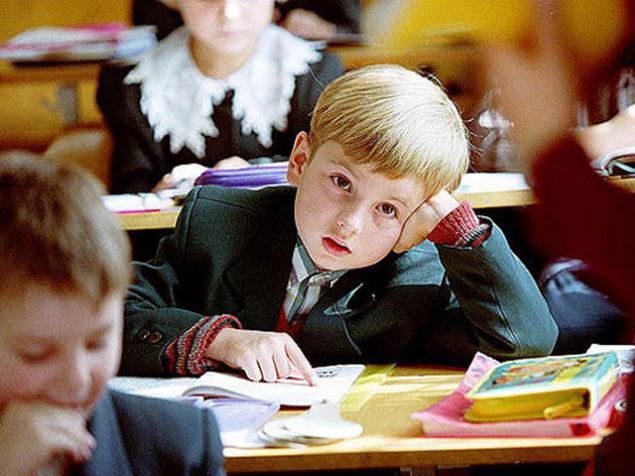
Empty-empty
Of course, there is nothing wrong in the fact that no one I know remembers quite clumsy poem from a school textbook. Does it matter if none of them remained in memory and that the characteristic morphology of garden roses for remembering which this poem was given: two of the five sepals have smooth edges, two – toothed, and the fifth one edge smooth, the other with teeth. And even if not all of them will remember what a "sepals", which crops and where they are located – it is also possible to survive. But for some time I found that about the same degree of safety of all the information that is taught in high school.
To clarify: we are talking about high school, about the program of secondary education. That "pass" between primary school and a matriculation certificate (during my own childhood, it was classes from fifth to tenth, now, if I'm not mistaken, is from the sixth to the eleventh). Traces of what we were taught in elementary school, visible with the naked eye: to consider (at least within the four arithmetic operations), to read and write (even with the mistakes, which we will have a separate conversation) able every. Yes, there was, in primary school, there were some more objects and classes, even the theme which we now fail to remember. Yes, not all of us can immediately figure out how to fold, say, 3/7 and 11/17 – though all, of course, was taught. But in any case, we definitely learned from this period a certain amount of established knowledge and skills and such, which many of us are unlikely to be able to learn to "casually" self-taught.
Less obvious, but no less certainly heritage high school. I had to ensure that man always remembers quite a lot of what was taught in the Institute, even if it's not working at his "graduation" specialty or was not working on it never. How useful this knowledge is depends how lucky you are (sometimes obtained once the skills come in handy in the most unexpected and unforeseen way), but in any case it is not going away.
But in between is a complete blank.
Everything we are taught in high school or did not remain in memory at all, whether it lies dormant, which its owner does not remember even when desperately in need of it. The only exceptions are information items, which people then studied at the high school.
It is clear that the graduate of the chemistry University (as well as any, which was part of the chemistry course), most likely remembers what an amphoteric compound and the aldehydes differ from ketones. And the man with the degree in history is unlikely to be confused the First battle of Poitiers with the Second.
But try to remember that you never returned after prom. For example: on whose side fought Italy, Bulgaria, Japan in the First world war? Or: some references indicate marginal water solubility in water 55,56. What does it mean? Rather than Archaeopteryx differs from the pterodactyl? Will sound like 527468 numeral in the instrumental case? Can you get hemophilia? Why insects, even wingless, can fall from any height, not breaking?..
This is not a collection of puzzles for scholars. In his school years, each of us have heard the exact and clear answer to each of these questions. Well it is fine, let's try just the forehead, is the only mind in the textbooks do not peek. So that States the first law of Newton? What is the principle of Le Chatelier? What is the allele, gamete, zygote? According to vieta theorem?
The leading programmes about science on the radio "Freedom" Alexander Kostinsky told me that once asked about fifty colleagues (half of whom were journalists with the all-Russian popular) question, what is the logarithm, and don't have a clear answer. Then he asked what is the sine – with the same result. Stravodimos, he started to figure out what all these educated, successful people I remember from school course of mathematics and physics.
Joint efforts managed to remember the phrase "Pythagorean theorem" and "Ohm's law", but no one was able to articulate to formulate what they say. Of course, fetching in his little survey was not completely representative of all of its respondents are a professional and social group. But it is difficult to assume that journalists deliberately select those who are not able to remember the school's wisdom.
But if all this is true, then what we spent our best years? After six years – six years! – we every day to get up, sweating, in utter hurt, pulled a hideous uniform, hatched almost motionless four to six hours and then again in the evening, sometimes until late at night, poring over all this wisdom. Suffered humiliation in front of the Board, listened to teacher and parent notation, desperately searched for a way to show my mom the diary, Dodge, earned a guilt complex and inferiority, cried, raged, thought about suicide...
Today, through all of this are the new generation – our children, nephews and grandchildren. The results are devastating: according to the recently published data of RAMS, Russia has practically no healthy children of school age. The reason pediatricians are usually the first thing called bad food – especially the abuse of fast food, has become for the current generation of children's doctors the main embodiment of world evil.
With this, however, does not agree, the rating of "school" disease, which first place is occupied by diseases of the musculoskeletal apparatus: flat feet, curvature of the spine, incorrect posture. No matter how harmful the chips and Cola, to bend the child's spine, they still can't. But it successfully does the school regime: the children several hours remain motionless in an unnatural position for them, and the change can only sedately walking down the hall as prisoners, – while their body is good mate yells that he needs to run, to jump, to climb, to stand on my head.
The human baby (like the baby of any mammal) are genetically programmed to continuously exercise your musculoskeletal system, is a necessary condition of its formation. And if the child is artificially deprived of such opportunity – is it any wonder that his skeleton, ligaments, muscles, and management skills all of these are gross violations?
In addition, the constant conflict of the requirements of the organism against school rules becomes a source of chronic stress – and he, as long ago it is known, is one of the main factors of development of diseases of the gastrointestinal tract (including stomach ulcers). So that these diseases, who is in the list of threats to children's health in the second place, our children must not only fast food. Even more difficult to write off on him a real epidemic of myopia and other vision disorders that afflict up to 40% of the graduates of Russian secondary schools.
But I now not about the health of the younger generation. I mean, we got to get our kids for hours and years, with the meat torn from the best time of life?
It turns out that nothing.
Unclaimed predicate
Usually it is said that, say, we knew all we had been taught, but then that had nothing to do with our life and work, forgotten. If so, a natural question would be whether or not to torture all the knowledge that then you will need one per thousand, and this one they still need to be taught separately. But it's not true.
Every winter I have to explain to any of his friends, that the flu is not treatable with antibiotics. Because it is not caused by bacterium and virus, don't have their own biochemical systems that could act as antibiotics. And each time my companions (adult, socially successful people with higher education) the principled difference between a bacterium and a virus is a complete revelation – most of them believed these words just synonyms.
Meanwhile, the textbooks explain in detail about the differences between these forms of life, and the flu certainly applies to everyone, and regularly. And ignorance in this matter can literally cost a man's life. The fact that the flu usually has a plume of secondary pneumonia caused by bacteria already – including often those who permanently live in human lungs and in "peacetime" aggressiveness is not showing. In humans, ingested antibiotics "preventively" such bacteria can acquire resistance – and then resultant pneumonia may not have time to cure.
Even in ancient Soviet times Leningrad sociologists conducted an ingenious study, selecting him for young Housewives – girls right after school, not go anywhere and not getting a job, marries, and sat with the children. All of them were asked a simple question: if the meat is cooked faster if you turn up the heat under a boiling pot? The vast majority answered "Yes." A few found it difficult to answer, probably suspecting some kind of trick is that they ask an obvious thing. That boiling temperature is a constant for a given composition of the liquid and does not depend on the intensity of the heated one of them recently passed high-school physics, where it explicitly States, is not remembered. Although the manifestations of this effect them in their daily lives had to face constantly.
Even in cases where school knowledge seems to be directly related to professional activities of man, it is often unnecessary. One of my colleagues once told me that you still don't know what a "predicate". They say, like is a word that expresses an action, but what then is a "verb"?
The existence of such categories as parts of speech and sentence, she did not even remember. This would not be surprising if it was about the person of any other profession – from chef to programmer, fitter to the sculptor. (Although again – why then torture them to make this useless knowledge?) But for the author of this recognition of the Russian language is the main and most common working tool. And she possesses them skillfully, being able not only to convey the subtle shades of meaning, but also to give the text the stylistic grace. And almost twenty years of doing this she never took the knowledge that such a predicate. So who was all this rattling in the joints linguistic conceptual apparatus that hundreds of thousands of poor teachers are trying to cram into the heads of millions more poor children?!
It should, perhaps, mention two more facts. Today in the high school program there are at least two objects more or less comparable in demand in adult life literacy and numeracy, a foreign (read – English) language and "Informatics", which refers to the basic skills of handling computer. These two skills are almost always useful to the owner than he would later in life was engaged (although, of course, different professions and positions differ greatly in terms of requirements in these areas: the driver-the trucker is not at all necessarily know English, but the better he knows, the better his chances are to find the best work for international flights).
So, among the people, a little bit of professional knowledge of at least one of these arts, I have not met no one who would have carried their skills from high school (except for graduates of language schools). No one even called the school as a place of receiving the original, basic knowledge, facilitate further learning. Language and computer possess special courses, in institutions, in the course of direct communication with native speakers of the necessary knowledge – in short, anywhere and everywhere, not only in school lessons.
And second, the situation you would understand if education, in General, enjoyed in a society of unconditional respect, and the fact of successful secondary education increased social status of a person – no matter what specific knowledge brought out this individual and how his life helped. (A similar role in our society begins to play a higher education – a kind of social access to "clean", non-physical work, even not associated with the specialty, which appears in the diploma).
Then the abolition of universal secondary education would mean that a certain proportion of children with annaokolo age doomed to low social status. However, modern Russian society is, to put it mildly, not unanimous in this respect the education. As evidenced by an August 2006 opinion poll, with the statement that for success in life and a good career is necessary to learn well in school, only 51% of adult Russians, while 40% believe that school grades do not affect career success. While 36% believe that the school is detrimental to mental and physical health of the child (47% of respondents continue to believe that education in the modern school allows the child to become a harmoniously developed personality with a broad Outlook and a good physical preparation). In other words, its function (if, of course, to consider that teaching children and preparing them for independent life in society), the average school is not performing not only in reality but in the view of society – or, at least, a fair part of it.published
To be continued.
Author Boris Zhukov
P. S. And remember, only by changing their consumption — together we change the world! ©
Join us in Facebook , Vkontakte, Odnoklassniki
Source: stengazeta.net/?p=10002742
– Try to guess who are the five brothers. Two bearded, two beardless...
– and last, the fifth looks ugly: just right beard, left no trace! – picked up and finished me.
How do you know? – astonishment asked my companion.
All present waited with interest for the answer. They were ten people, all between the ages of thirty and forty, highly educated, professionally successful and culturally developed. Each of them at the time, not just once or twice were holding the book with this poem. And no it is not remembered. And when I called her, I just refused to believe it.
To me remained nothing how to take off the shelf this book – a textbook of botany for secondary schools – and making sure that everyone studied it, open it to a page, where was the mystery and its solution. The whole company looked at me as if I looked in the book for something it was not and could not be – say, a couple of pages on drevnerusskom the language or description of events that occurred many years after its release. Even after reminders and demonstrations no one remembered that he'd taught...

Empty-empty
Of course, there is nothing wrong in the fact that no one I know remembers quite clumsy poem from a school textbook. Does it matter if none of them remained in memory and that the characteristic morphology of garden roses for remembering which this poem was given: two of the five sepals have smooth edges, two – toothed, and the fifth one edge smooth, the other with teeth. And even if not all of them will remember what a "sepals", which crops and where they are located – it is also possible to survive. But for some time I found that about the same degree of safety of all the information that is taught in high school.
To clarify: we are talking about high school, about the program of secondary education. That "pass" between primary school and a matriculation certificate (during my own childhood, it was classes from fifth to tenth, now, if I'm not mistaken, is from the sixth to the eleventh). Traces of what we were taught in elementary school, visible with the naked eye: to consider (at least within the four arithmetic operations), to read and write (even with the mistakes, which we will have a separate conversation) able every. Yes, there was, in primary school, there were some more objects and classes, even the theme which we now fail to remember. Yes, not all of us can immediately figure out how to fold, say, 3/7 and 11/17 – though all, of course, was taught. But in any case, we definitely learned from this period a certain amount of established knowledge and skills and such, which many of us are unlikely to be able to learn to "casually" self-taught.
Less obvious, but no less certainly heritage high school. I had to ensure that man always remembers quite a lot of what was taught in the Institute, even if it's not working at his "graduation" specialty or was not working on it never. How useful this knowledge is depends how lucky you are (sometimes obtained once the skills come in handy in the most unexpected and unforeseen way), but in any case it is not going away.
But in between is a complete blank.
Everything we are taught in high school or did not remain in memory at all, whether it lies dormant, which its owner does not remember even when desperately in need of it. The only exceptions are information items, which people then studied at the high school.
It is clear that the graduate of the chemistry University (as well as any, which was part of the chemistry course), most likely remembers what an amphoteric compound and the aldehydes differ from ketones. And the man with the degree in history is unlikely to be confused the First battle of Poitiers with the Second.
But try to remember that you never returned after prom. For example: on whose side fought Italy, Bulgaria, Japan in the First world war? Or: some references indicate marginal water solubility in water 55,56. What does it mean? Rather than Archaeopteryx differs from the pterodactyl? Will sound like 527468 numeral in the instrumental case? Can you get hemophilia? Why insects, even wingless, can fall from any height, not breaking?..
This is not a collection of puzzles for scholars. In his school years, each of us have heard the exact and clear answer to each of these questions. Well it is fine, let's try just the forehead, is the only mind in the textbooks do not peek. So that States the first law of Newton? What is the principle of Le Chatelier? What is the allele, gamete, zygote? According to vieta theorem?
The leading programmes about science on the radio "Freedom" Alexander Kostinsky told me that once asked about fifty colleagues (half of whom were journalists with the all-Russian popular) question, what is the logarithm, and don't have a clear answer. Then he asked what is the sine – with the same result. Stravodimos, he started to figure out what all these educated, successful people I remember from school course of mathematics and physics.
Joint efforts managed to remember the phrase "Pythagorean theorem" and "Ohm's law", but no one was able to articulate to formulate what they say. Of course, fetching in his little survey was not completely representative of all of its respondents are a professional and social group. But it is difficult to assume that journalists deliberately select those who are not able to remember the school's wisdom.
But if all this is true, then what we spent our best years? After six years – six years! – we every day to get up, sweating, in utter hurt, pulled a hideous uniform, hatched almost motionless four to six hours and then again in the evening, sometimes until late at night, poring over all this wisdom. Suffered humiliation in front of the Board, listened to teacher and parent notation, desperately searched for a way to show my mom the diary, Dodge, earned a guilt complex and inferiority, cried, raged, thought about suicide...
Today, through all of this are the new generation – our children, nephews and grandchildren. The results are devastating: according to the recently published data of RAMS, Russia has practically no healthy children of school age. The reason pediatricians are usually the first thing called bad food – especially the abuse of fast food, has become for the current generation of children's doctors the main embodiment of world evil.
With this, however, does not agree, the rating of "school" disease, which first place is occupied by diseases of the musculoskeletal apparatus: flat feet, curvature of the spine, incorrect posture. No matter how harmful the chips and Cola, to bend the child's spine, they still can't. But it successfully does the school regime: the children several hours remain motionless in an unnatural position for them, and the change can only sedately walking down the hall as prisoners, – while their body is good mate yells that he needs to run, to jump, to climb, to stand on my head.
The human baby (like the baby of any mammal) are genetically programmed to continuously exercise your musculoskeletal system, is a necessary condition of its formation. And if the child is artificially deprived of such opportunity – is it any wonder that his skeleton, ligaments, muscles, and management skills all of these are gross violations?
In addition, the constant conflict of the requirements of the organism against school rules becomes a source of chronic stress – and he, as long ago it is known, is one of the main factors of development of diseases of the gastrointestinal tract (including stomach ulcers). So that these diseases, who is in the list of threats to children's health in the second place, our children must not only fast food. Even more difficult to write off on him a real epidemic of myopia and other vision disorders that afflict up to 40% of the graduates of Russian secondary schools.
But I now not about the health of the younger generation. I mean, we got to get our kids for hours and years, with the meat torn from the best time of life?
It turns out that nothing.
Unclaimed predicate
Usually it is said that, say, we knew all we had been taught, but then that had nothing to do with our life and work, forgotten. If so, a natural question would be whether or not to torture all the knowledge that then you will need one per thousand, and this one they still need to be taught separately. But it's not true.
Every winter I have to explain to any of his friends, that the flu is not treatable with antibiotics. Because it is not caused by bacterium and virus, don't have their own biochemical systems that could act as antibiotics. And each time my companions (adult, socially successful people with higher education) the principled difference between a bacterium and a virus is a complete revelation – most of them believed these words just synonyms.
Meanwhile, the textbooks explain in detail about the differences between these forms of life, and the flu certainly applies to everyone, and regularly. And ignorance in this matter can literally cost a man's life. The fact that the flu usually has a plume of secondary pneumonia caused by bacteria already – including often those who permanently live in human lungs and in "peacetime" aggressiveness is not showing. In humans, ingested antibiotics "preventively" such bacteria can acquire resistance – and then resultant pneumonia may not have time to cure.
Even in ancient Soviet times Leningrad sociologists conducted an ingenious study, selecting him for young Housewives – girls right after school, not go anywhere and not getting a job, marries, and sat with the children. All of them were asked a simple question: if the meat is cooked faster if you turn up the heat under a boiling pot? The vast majority answered "Yes." A few found it difficult to answer, probably suspecting some kind of trick is that they ask an obvious thing. That boiling temperature is a constant for a given composition of the liquid and does not depend on the intensity of the heated one of them recently passed high-school physics, where it explicitly States, is not remembered. Although the manifestations of this effect them in their daily lives had to face constantly.
Even in cases where school knowledge seems to be directly related to professional activities of man, it is often unnecessary. One of my colleagues once told me that you still don't know what a "predicate". They say, like is a word that expresses an action, but what then is a "verb"?
The existence of such categories as parts of speech and sentence, she did not even remember. This would not be surprising if it was about the person of any other profession – from chef to programmer, fitter to the sculptor. (Although again – why then torture them to make this useless knowledge?) But for the author of this recognition of the Russian language is the main and most common working tool. And she possesses them skillfully, being able not only to convey the subtle shades of meaning, but also to give the text the stylistic grace. And almost twenty years of doing this she never took the knowledge that such a predicate. So who was all this rattling in the joints linguistic conceptual apparatus that hundreds of thousands of poor teachers are trying to cram into the heads of millions more poor children?!
It should, perhaps, mention two more facts. Today in the high school program there are at least two objects more or less comparable in demand in adult life literacy and numeracy, a foreign (read – English) language and "Informatics", which refers to the basic skills of handling computer. These two skills are almost always useful to the owner than he would later in life was engaged (although, of course, different professions and positions differ greatly in terms of requirements in these areas: the driver-the trucker is not at all necessarily know English, but the better he knows, the better his chances are to find the best work for international flights).
So, among the people, a little bit of professional knowledge of at least one of these arts, I have not met no one who would have carried their skills from high school (except for graduates of language schools). No one even called the school as a place of receiving the original, basic knowledge, facilitate further learning. Language and computer possess special courses, in institutions, in the course of direct communication with native speakers of the necessary knowledge – in short, anywhere and everywhere, not only in school lessons.
And second, the situation you would understand if education, in General, enjoyed in a society of unconditional respect, and the fact of successful secondary education increased social status of a person – no matter what specific knowledge brought out this individual and how his life helped. (A similar role in our society begins to play a higher education – a kind of social access to "clean", non-physical work, even not associated with the specialty, which appears in the diploma).
Then the abolition of universal secondary education would mean that a certain proportion of children with annaokolo age doomed to low social status. However, modern Russian society is, to put it mildly, not unanimous in this respect the education. As evidenced by an August 2006 opinion poll, with the statement that for success in life and a good career is necessary to learn well in school, only 51% of adult Russians, while 40% believe that school grades do not affect career success. While 36% believe that the school is detrimental to mental and physical health of the child (47% of respondents continue to believe that education in the modern school allows the child to become a harmoniously developed personality with a broad Outlook and a good physical preparation). In other words, its function (if, of course, to consider that teaching children and preparing them for independent life in society), the average school is not performing not only in reality but in the view of society – or, at least, a fair part of it.published
To be continued.
Author Boris Zhukov
P. S. And remember, only by changing their consumption — together we change the world! ©
Join us in Facebook , Vkontakte, Odnoklassniki
Source: stengazeta.net/?p=10002742







